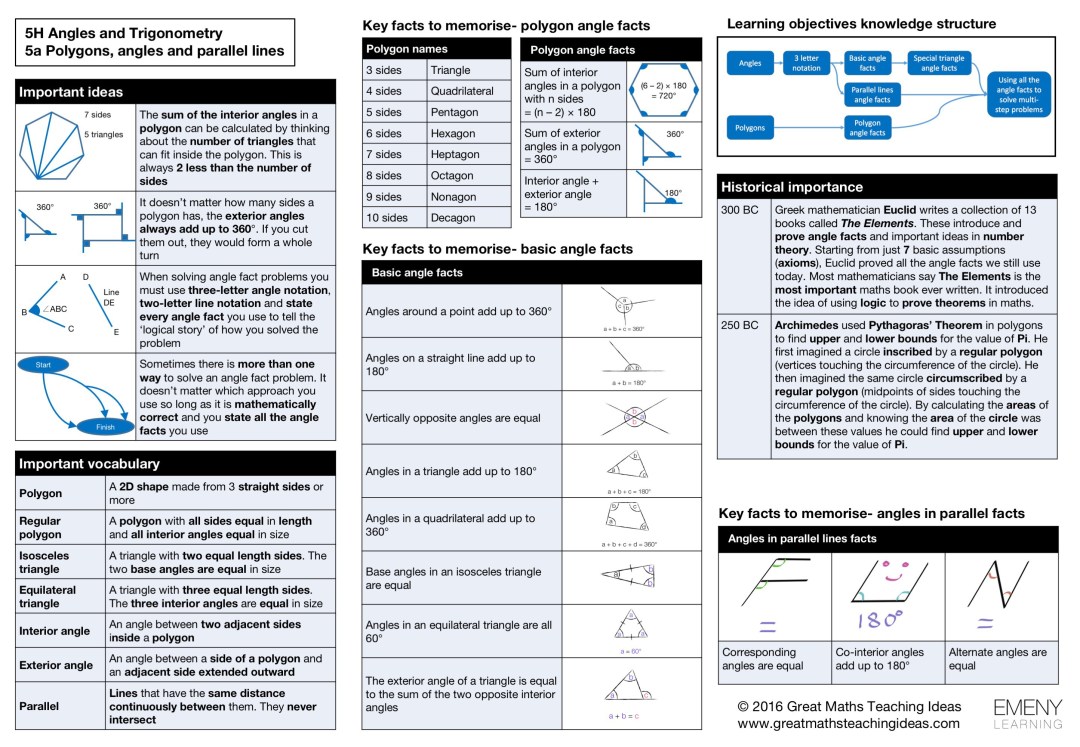(credit to Altrincham Grammar School for Girls for some of the content used below)
What is a “knowledge organiser”?
It is a sheet which organises all the most vital, useful and powerful knowledge about a given topic on a single page.
So just a revision sheet then??
Maybe but Knowledge Organisers are designed to fit certain criteria: Teachers try hard to choose the most valuable content that they want all pupils to remember for ten years and beyond. And for each unit, they should discipline themselves to distill it onto a single page, using sentences that should ideally not exceed around 25 words.
When a new teacher starts in a school, one of the first questions they have is ‘what do I teach?’ At a single glance, knowledge organisers answer that. Everything pupils need to know for the year is set out clearly in advance. In theory, any teacher can pop into anyone else’s lesson, look at the unit organiser, and see what every pupil is working on.
How else can a Knowledge Organiser help?
Pupils can develop their memory of the knowledge being delivered: Knowledge organisers ahould be given to all pupils at the start of each unit to help them remember what they’re learning. No longer out of sight, out of mind: instead of leaving behind previous units’ content, teachers can recap quickly and easily in lessons. Instead of forgetting all about it, pupils continually revisit and retrieve prior learning from their memories.
Every lesson, across all subjects, knowledge organisers can be used as a pack of in-lesson quizzes. The numbers and columns here help turn the grids into simple in-class quizzes. Emboldening key words allows pupils to peer-mark the more complex definitions, working out which terms are vital in them.
So they will help with revision then?
Absolutely. Whilst not always being exhaustive, they are designed to provide pupils with the key facts in a more easily digestible form.
And homeworks…?
Again schools are using Knowledge Organisers to try to structure meaningful homeworks. The French department at Michaela Community School says: “Pupils use the Knowledge Organisers for their homework. Each week they complete one A5 page of Self Quizzing on a section of the knowledge organiser. The quantity (how many lines?) and nature (particularly tricky phrases?) set can depend on the capacity of the class. Pupils are encouraged to read aloud as they write, to CUDDLE [do what?! any guesses anyone??] carefully, to quiz themselves regularly, for 10 minutes at a time, in order to embed the language. When they do their quizzing, they begin by copying letter by letter to promote accuracy. Later on, when they know the language better, they can take a more Look/Cover/Write/Check approach.
Each week, after pupils have done their homework, they will be set a quiz on the lines that they have learned, as well as recapping previous organisers, or practising de-contextualised HFV (high frequency vocabulary). The recapping of previous material is very important, as it impedes the forgetting curve.”
(Taken from https://jlmfl.wordpress.com/2017/04/23/michaela-french-how-we-use-knowledge-organisers/)
But I thought education was all about developing pupils’ skills?
Skills-based education in itself can be of limited value if heightened knowledge is not the end result. (The Michaela school says “The problem with skills-based lessons is that they don’t require thinking about anything you can commit to memory. Nothing is learned because nothing is being remembered. Over years and years of skills-based teaching, children aren’t actually learning anything. They are simply practising some skills in a near vacuum.”).
See this piece which argues the importance of a knowledge-based curriculum:
https://pragmaticreform.wordpress.com/2015/02/07/a-knowledge-led-school/
(its summary is:
The more knowledge you remember, the more curious you become.
The more knowledge you remember, the more intelligent you become.
The more knowledge you remember, the more you achieve academically.
The more knowledge you remember, the more choices you have for your future.)
So what does a Knowledge Organiser look like?
Below is an example for History. There are many others to be found simply by Googling Knowledge Organisers then selecting images (clicking here should achieve the same).



The description above is specifically for French, hence the reference to CUDDLES, more on which can be found here: https://jlmfl.wordpress.com/2017/01/15/aides-memoire-1-cuddles/
LikeLiked by 1 person